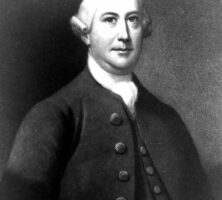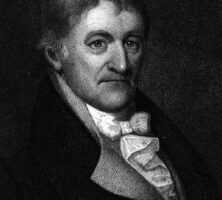The Habershams—James and his sons, James Jr., Joseph, and John—were prominent in the economic and political life of colonial, revolutionary, and early national Georgia.
Their connection with Georgia history began with the arrival of James Habersham (ca. 1712-75) in colonial Georgia in 1738. Although trained as a merchant in his uncle’s firm in London, England, James Habersham developed a strong religious friendship with George Whitefield and, when asked, accompanied the evangelist to Georgia as a teacher. Over time, Habersham became superintendent and financial manager of Bethesda, the orphanage Whitefield established near Savannah. In 1740, while at Bethesda, Habersham married Mary Bolton.

In the early 1740s Habersham formed a business association with Francis Harris of Savannah to begin shuttling supplies from Charleston to Savannah and Bethesda. As the Trustees’ grip on colonial Georgia loosened, Habersham and Harris set up a firm in Savannah to begin making regular transatlantic commercial voyages to England. Their firm is recognized as the first such successful business enterprise in colonial Georgia.
With resources from his business, Habersham began acquiring lands for rice planting along rivers near Savannah. Once the ban on slavery ended in Georgia, Habersham developed extensive rice plantations on holdings eventually totaling nearly 15,000 acres, worked by about 200 enslaved people. By the 1750s he had begun to become politically prominent as well, as a senior councillor in the royal government of the colony. He also served as council president and held the position of acting governor of Georgia in the early 1770s.
All three of Habersham’s sons became actively involved in the Revolutionary movement. Joseph Habersham, in particular, became a zealous revolutionary in 1774, although his aging father expressed his own loyalty to Britain. The senior Habersham’s death in 1775 prevented the painful family division from extending into the war years.
During those years Joseph and his younger brother, John, pursued careers in the Continental army that eclipsed the career of their elder brother, James Jr., who remained satisfied with political and financial involvement in the Revolution. Joseph rose to the rank of colonel but resigned Continental army service during the war. His resignation stemmed partly from his involvement in the notorious McIntosh-Gwinnett duel and partly from his desire to enter state politics as a moderate opposed to the liberty faction of Midway and Sunbury. John continued his career in the Continental army, rising to the rank of major. He was twice captured (at the fall of Savannah and the fall of Charleston, South Carolina) and twice exchanged in active service throughout the war.

At war’s end the Habersham brothers concentrated on restoring family plantations at Dean Forrest, Silk Hope, and Beverly. Though involved in commerce on the eve of the Revolution, they did not reenter business. All three engaged in postwar politics as members of the Georgia assembly. Joseph and John also were appointed to the Confederation Congress in the 1780s. The brothers actively supported the adoption of the constitution in 1788.
As rewards for Revolutionary service, during the 1790s President George Washington appointed Joseph Habersham postmaster general of the United States and his brother, John, port collector for Savannah. In 1799 both James Jr. and John died suddenly within a few months of each other. Joseph thereupon became the second-generation family patriarch, helping third-generation descendants achieve success as planters, merchants, lawyers, and physicians in the antebellum era.
Prompted to resign as postmaster general by President Thomas Jefferson in 1801, Joseph Habersham, having served under presidents Washington and Adams, resumed a planter-merchant career in Georgia. With the assistance of Federalist political friends, he became the first president of the Savannah branch of the Bank of the United States, a position he held until the termination of the bank in 1815. Thereafter, he retired to his planting-business career until his death in 1815. Habersham County was named in his honor upon its creation in 1818.
Members of the third Habersham generation and their offspring continued as noteworthy economic, professional, and cultural figures in Savannah and beyond well into the antebellum years. One descendant, Josephine Clay Habersham, is particularly remembered for her diary of Savannah in the Civil War (1861-65). The Habersham family name seems to have disappeared by the twentieth century, though descendants are still to be found.








